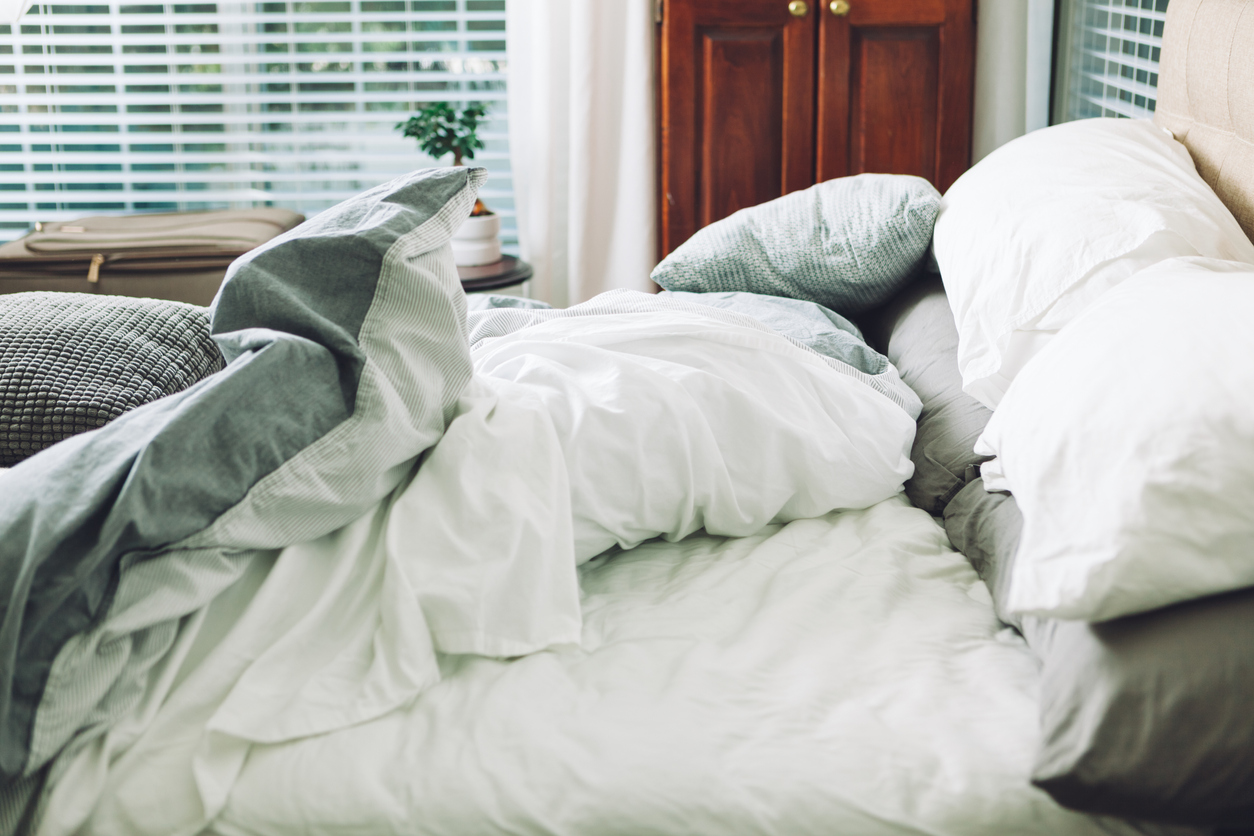Can’t stay asleep? Maybe it’s time for new bedding

When you think of your bed, visions of ultimate comfort, relaxation, and worry-free feelings should come to mind. If that’s not the case, it may be time to re-think what makes your bed and bedroom a sanctuary for sleep. Pillows, sheets, comforters, and the like are all key elements that you might not realize would make a huge difference in your sleep, but the way our bodies work requires us to get the right level of warmth and comfort in order to get the sleep we need. If you’ve been struggling to stay asleep at night, changing your bedding might be a key element you’ve overlooked.
Temperature and your blankets
As we get sleepy in the evening, our body temperature actually drops and then maintains a reduced temperature while we sleep. This is the body’s way of conserving energy while at rest. Tied to this, we need to keep ourselves warm to prevent waking up with a chill. So really, sheets and blankets play a pivotal role in helping us stay asleep at night!
Finding the right sheet thickness or fabric type can be a good starting place. Higher thread counts offer more softness, while flannel sheets can provide extra warmth and coziness on extra cool nights. Many people feel that natural fibers instead of artificial ones provide more comfort and help regulate temperature better at night. Also, most people sleep better when their bedding is clean, so it’s recommended that you wash your sheets every week in order to keep them nice and fresh.
Blankets, duvets, or comforters are important to think about too. Lighter options are best if you run warm at night but still want the comfort and secure feeling of a blanket on your body while sleeping. Heavier top layers are a great option if you enjoy that feeling of some weight on you while you sleep. In fact, research participants in SleepScore Labs’ validation study on Gravity Blanket reported sleep improvement as well as increased feelings of relaxation when using the weighted blanket.
As the seasons change, consider changing to different types of bedding to help you sleep at your preferred temperature and comfort level. These adjustments can make a notable difference in your sleep!
What about pillows?
Asking someone what kind of pillow they prefer can result in a very emphatic answer. A 2018 tweet went viral after someone made the claim that fluffy pillow supporters were superior to flat pillow advocates. Two sides quickly formed, and the debate was on.
There’s a lot to be said about a pillow’s impact on sleep. The experts say, yes, in fact pillows can be incredibly helpful or hurtful to sleep. The wrong pillow can leave you with neck pain or body discomfort, resulting in more awakenings and a restless night. The right pillow, as simple as it sounds, can keep you both supported and comfortable, resulting in one fewer reason you might wake up in the night. However, the “right” or “wrong” pillow depends on personal preference. There is no single recommendation that will hold true for everyone. You need to try various options to figure out what is best for you, and keep in mind that your personal preferences might change over time too.
Different pillow sizes and levels of firmness can create a custom experience for you. In addition, there are many specialty pillows available to help different kinds of sleepers get the best sleep possible. For example, if you feel that you sleep hot, cooling pillows can be a good option to investigate. Body and pregnancy pillows can be great for those who want full body comfort and support. For side sleepers, there are pillows designed not only for under the head but also for in between the knees. There are also pillows designed to elevate and add support to particular parts of the body. For example, different types of wedge pillows that raise the upper torso can help with shoulder pain, snoring, or acid reflux. Many options exist for all kinds of sleepers, so don’t settle for the first pillow you come across.
Once you’ve found pillows that work well for you, be sure to take proper care of them. If your pillow has a cover, wash it regularly. As for cleaning the pillow itself, follow the manufacturer’s instructions. Finally, don’t forget to replace your pillow when it’s no longer helping you get a good night of sleep.
Don’t forget about your mattress!
We spend an average of about 1/3 of our life in bed. Since most of that will be on a mattress, it’s important and worthwhile to do your research, save up, and find the mattress feels best for you. With various options such as memory foam, innerspring, latex, hybrid, and so on, there’s sure to be a mattress out there that’s right for you. It may take a little time to find your best match, but once you do it will help you get the sleep you deserve.
When it comes to picking out the right mattress, if possible, that’s best done in person so you can literally feel the differences between mattresses and discover which suits you best. After your purchase, remember to follow the manufacturer’s instructions on the label to keep it clean and maximize its lifespan. Depending on wear and care, many high quality mattresses can last up to 10 years. By planning to replace your mattress every 8 years, you’ll avoid future discomfort from sleeping on a worn out mattress.
You can check out SleepScore’s Store of expertly selected products that have all be tried at home by sleep experts, so you’ll be browsing only the best recommendations.
Want to know how well you’re sleeping with your current bedroom setup? Check out the FREE SleepScore App to accurately track your sleep using just your smartphone. Then, as you try new bedding products, continue tracking and see how your sleep improves!